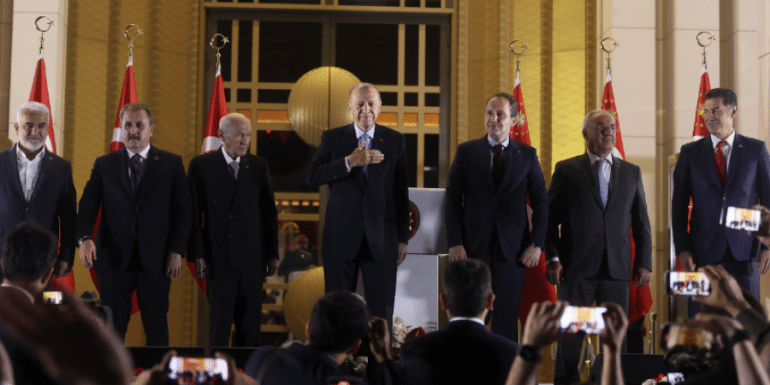The steadfast Recep Tayyip Erdogan won the second round of Turkey's presidential election on Sunday, after which he remains the country's ruler for another five years.
Standing on a bus outside his home in Istanbul, on the Asian side of the Bosphorus, the 69-year-old head of state, who has ruled Turkey for the past 20 years, delivered his speech in front of a sea of red flags held by an enthusiastic host.
"Our nation entrusted us with the responsibility of governing the country for the next five years," he declared, at the end of a vote that forced him into a runoff for the first time.
According to the results with 99,43% of the ballots counted, announced by the Supreme Electoral Council, the head of state received 52,14% of the votes, against 47,86% of his social democratic opponent, 74-year-old Kemal Kilicdaroglu, the who lost the bet of change, peace and democracy that he promised.
Spontaneous gatherings formed everywhere in the cities where Erdogan triumphed, especially in the heart of Anatolia.
Neither the desire to change and open up part of the electorate, nor the high inflation in Turkey, nor the restrictions on freedoms and the superpowers of a presidency that sent tens of thousands of opposition members to prison or exile, did not affect the desire for security and stability which had already been expressed in the first round of elections.
https://twitter.com/RTErdogan/status/1662956788314931201?s=20
50.000 dead
Not even the consequences of February's terrible earthquake (at least 50.000 dead and 3 million displaced) in eleven southern provinces of the country, which largely supported Erdogan in the elections.
President Erdogan's party, the Islamist-conservative Justice and Development Party (AKP), on which he built his rise to the country's highest office, lost seats in parliament but retains its majority with its allies.
Kemal Kilicdaroglu, for his part, experienced yet another defeat, despite his campaign promising the "return of spring".
Considered by many, including the opposition, a boring candidate with no charisma, Kilicdaroglu, who led a six-party coalition, had come to impose his own stamp and be called the "grandfather democrat".
But he was unable to force the economy or the crisis into the pre-election debate. He declared that he will continue his fight and is "deeply saddened" by the difficulties that await his country
"He is the right person. I expect Erdogan to continue to bring good things to the country and first of all the recovery of the economy," said 17-year-old Nisa Sivaslioglu, heading to the huge presidential palace in Ankara, where the winner is expected at night.
Erdogan voted at noon in Istanbul's Uskundar district: a cheering crowd awaited him there, with bodyguards handing out toys while the president threw some banknotes at children.
Almost simultaneously, smiling despite the unfavorable forecasts, Kilicdaroglu voted in Ankara, encouraging his fellow citizens to vote "to get rid of an authoritarian government".
Erdogan's camp did not stop calling the opposition led by Kilicdaroglu "terrorist" because of the support it had from the leaders of the pro-Kurdish HDP party.
Citizens interviewed by Agence France-Presse in the queues of polling stations expressed the polarization in the country after these weeks of election campaigning.
Difficult campaign
In Ankara, Mehmet Emin Ayaz, a 64-year-old businessman, considered it "important to preserve the achievements of the last twenty years in Turkey" under Erdogan's rule. On the other hand, Aysen Giudai, a 61-year-old pensioner, wanted this election to be a "referendum" against the president and chose Kemal Kilicdaroglu.
Without access to the mainstream media and especially the official television networks, Kilicdaroglu fought on Twitter when his supporters tried to mobilize voters by going door-to-door in major cities.
Against this distinctive Alevi — a branch of Islam considered heretical by strict Sunnis — Recep Tayyip Erdogan has scaled up the rallies, banking on his so-called transformation of the country since becoming prime minister in 2003.
Erdogan is being re-elected ten years after the start of the large "Gezi" protests that had spread across the country and were violently suppressed.
Source: RES-EAP
